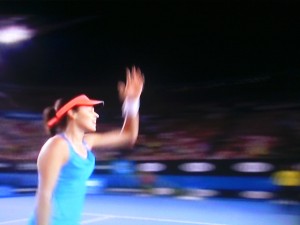- Joined
- Aug 8, 2013
- Messages
- 1,417
- Reactions
- 172
- Points
- 63
 One of my favorite old re-runs is the Dick Cavett Show on Decades Network. The witty Nebraskan was a popular TV figure in the 70s with his own interview show. A couple of weeks ago I taped the two-segment show with Arthur Ashe as the guest and was quite startled to learn that Ashe completely disagreed with the equal prize money issue which was orchestrated by Billie Jean King.
One of my favorite old re-runs is the Dick Cavett Show on Decades Network. The witty Nebraskan was a popular TV figure in the 70s with his own interview show. A couple of weeks ago I taped the two-segment show with Arthur Ashe as the guest and was quite startled to learn that Ashe completely disagreed with the equal prize money issue which was orchestrated by Billie Jean King.Although I once interviewed Ashe in 1992 for a short Biofile at the Pathmark Classic Mahwah tennis exhibition, I didn’t really get a sense for how smart of a man he was. On Cavett’s show, I certainly did.
Cavett instigated the equal prize money debate and Ashe explained his position. “We’ve come to realize, like other sports, our appeal (as tennis players) is about 70% entertainment and 30% sport,” said Ashe on the 1980 telecast in a New York City studio. “And as such, the amount of money that we make or we can command in prize money, is directly related to our box office appeal. What I said was that women don’t deserve the same amount of prize money as men. They don’t. We are not out there making car doors for Ford Motor Company. One example that I like to use is let’s suppose that Caesars Palace (in Las Vegas) was going to have The Carpenters (perform a concert) one week and Frank Sinatra the next week. Now would you pay Frank Sinatra the same that you would pay The Carpenters? Obviously not. You’d pay Frank quite a bit more than you’d pay The Carpenters. For the exact same number of hours.”
“All I was saying was that the caliber or quality of matches put on by a draw of 128 women, in no way, right now in the Fall of 1980, equals the appeal of a draw of the best 128 men. One day the women might command more. But right now it’s not the same. But at the top, there’s no question that Chrissie or Tracy Austin, they are just as powerful as a Borg or a McEnroe. But, unfortunately, in the first round of 64 matches, the top women usually win those matches very easily. Chrissie Evert seldom loses more than two games a set before she gets to the quarterfinal. But it’s almost assuredly one of the sixteen seeds in the men’s will lose in the first or second round.”
As one might expect, Billie Jean King was hardly amused by Ashe’s contradictory position, according to Ashe, who was retired from the sport at the time of the show, having been forced to retire because of a heart attack just a few years after he won Wimbledon in 1975. Ashe revealed that King confronted him about his equal prize money opinions. “Billie Jean…she got on me,” said Ashe. “She said, ‘How can you do that? After all i supported you through the civil rights days. You let me down.’ I said, ‘Billie Jean, it’s apples and oranges. We’re not talking about the same thing. I would support you whole-heartedly if you were striking Ford Motor Company because they didn’t pay you the same as the pay a man for doing the same job. But this is entertainment. This is not a job like most other people have. It’s whatever you can bargain for.'”
Ashe said King did not accept his argument points. “She wants to say equal pay for equal work but that has nothing to do with it.”
By Scoop Malinowski

